We are so happy to publish Luz Restrepo’s presentation to the Human Library of Expatclic. Her story and experiences are such an example of how we can become real advocates of what we strongly believe must be done to make this world a better place.
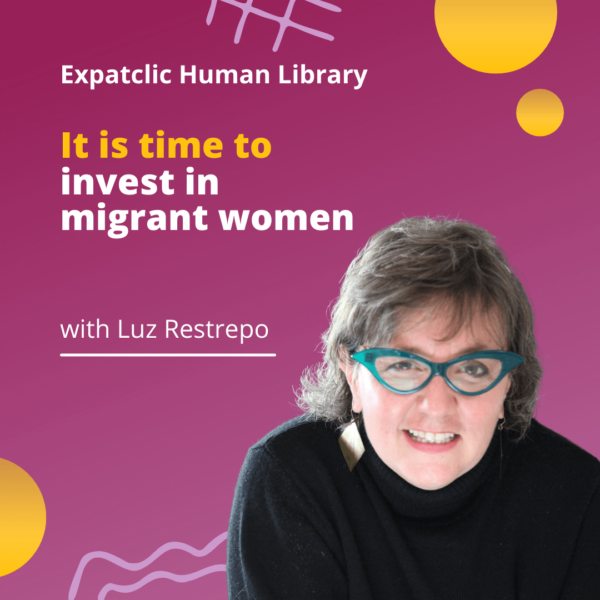 I was born in Colombia, and have lived in Australia since 2010. My family and I were forced to take the decision to move here because of the political situation in our home country. We had to decide between staying and risking our lives and the lives of our daughters, or moving to a safer place.
I was born in Colombia, and have lived in Australia since 2010. My family and I were forced to take the decision to move here because of the political situation in our home country. We had to decide between staying and risking our lives and the lives of our daughters, or moving to a safer place.
What I immediately felt put me in a position of disadvantage was that I spoke no English. And as many of you know, when we don’t speak the language, when we know no one, when we don’t know where we are, we need to start all over again. And starting again means that we must eat humble pie and learn again how to connect with the human and physical environment surrounding us. Certainly, as all moms will confirm, the wellbeing of our children is our top priority when we arrive in a new place. But as mothers and wives, while our husbands and children advance in the new country, we go backwards. We build our bubble of comfort within a close, known community, but we have no opportunities outside of it.
When I started to learn English, we did not have the resources to cover expensive courses. I started to study English in community centres in the suburbs of Melbourne. My classmates were all women that had settled in this country, three, five, some of them twenty years before. And while my English advanced well, their level remained the same. That made me wonder, “Why am I different?” I think one of the factors is education. When you are educated back home, you are more prone to absorb new things. You are also more curious: I was the only one in the class to ask for synonyms, antonyms, and spellings. What happens is also that many women that already live in a poverty circle in their home country come here and experience the additional barrier of the new language. And when they find themselves in the same class with other people who know how to navigate the education system, they are disadvantaged.
At that point I also realized that we learn the language by doing something meaningful in society, outside our homes. One such thing is a job, but how can you find a job when you are struggling to write the simplest things on paper? The solution I saw was to create a business together. I thought we should support each other. They had little English but lots of connections. We started to make handicrafts. We made crafts at home, and I looked for marketing opportunities in Melbourne. When we went to sell our handicrafts in the markets, we realized that our group of twenty-five multicultural women was very attractive to people. People loved to come and talk to us; they engaged themselves in our stories and bought our products. And by selling our products, we started enjoying the idea of having our own money, and our business minds began to develop.
Eight years ago I founded a charity, because no one wanted to lend me money for a proper business. We called it SisterWorks, Possibly it was my confidence as a businesswoman and the beauty of our mission that attracted more and more people to support migrant women’s economic empowerment. The organization grew rapidly. When the pandemic started, SisterWorks was supporting 900 women from more than 70 countries. We developed new ideas to create new products to sell on a big scale in supermarkets, other retail outlets, our own shops and online. SisterWorks fulfilled a need and UN Women came to us to find out how our business model was working. Our model of learning by doing and creating a sense of belonging and community support is now a worldwide pilot scheme with UN Women. As CEO, I oversaw the growth of the organisation from functioning on a zero-income, volunteer basis to one thriving with a staff of 20 and a $1.4M annual turnover by May 2020.
Two years ago, I realized that I am an entrepreneur, but my charity needed a manager – someone capable of developing systems and processes with the employees. I also realized that when long term unemployed migrant women find their first job in this country, they lose their voices, because they are not going to complain to their bosses. And I was the boss. They were doing all I said, but sometimes they disagreed with me. I didn’t know that, and when I found out, I realized I was taking their voices away, and I needed to give them their voices back.
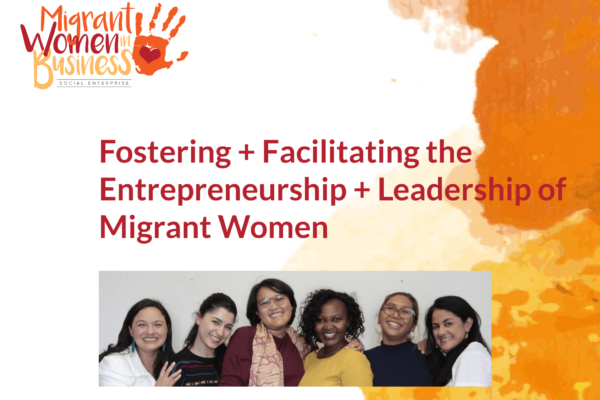 In June 2020, in partnership with an amazing Australia businesswoman, Corinne Kemp, we founded Migrant Women in Business, an Australia-wide social enterprise that supports migrant and refugee women with nano or micro businesses to thrive and grow, and for their owners to become community leaders.
In June 2020, in partnership with an amazing Australia businesswoman, Corinne Kemp, we founded Migrant Women in Business, an Australia-wide social enterprise that supports migrant and refugee women with nano or micro businesses to thrive and grow, and for their owners to become community leaders.
Migrant Women in Business is a business, not a charity. The other thing I learned in this journey is that we migrants are not vulnerable people, and when we put ourselves within a charity contest, people see us as persons to help. But as new migrants, we don’t need charity – we just need to learn how to navigate in a new country. That’s why I created Migrant Women in Business as a business. I want to help migrant women to give a good structure to their business. I want to provide everything around a business: legal and financial care, product development, promotion, collaboration. The concept is to work together to learn from each other, and on the way, we support micro businesses of migrant women, which in turn generate work and welfare. This is the ecosystem of Migrant Women in Business in a nutshell.
Starting online in the middle of the pandemic, Corinne and I identified the need for networking activities and easily accessible digital tools designed for migrant women entrepreneurs who have varying levels of English literacy, technology skills, business opportunities and understanding of business culture in Australia. Migrant Women in Business is currently working for and with more than 90 businesswomen with migrant and refugee backgrounds, offering them commercial opportunities through our Made by Many Hands platform, and hands-on small business experts supported through Made by Many Minds.
33% of independent businesses in Australia are created by migrants, but only one out of ten is created by a migrant woman. We are the last in line. Also, there is little representation of migrant women in politics and business in Australia. I strongly believe that this is the time to have more women leaders in the world. We take care of the family, we are carers, we are leaders, and it’s time we were more represented in the public sphere. This is how we can create diversity.

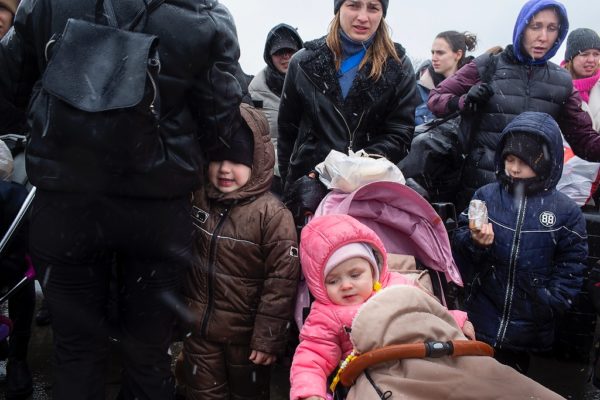
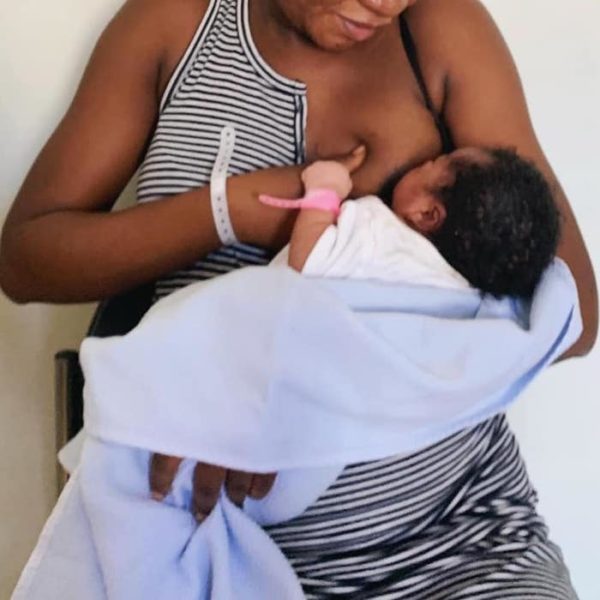 I must confess that it wasn’t easy to write this article: in my present circumstances, it’s difficult to talk about myself as a sort of protagonist, when my firm belief is that every person with whom I work deserves the honour of being centre stage.
I must confess that it wasn’t easy to write this article: in my present circumstances, it’s difficult to talk about myself as a sort of protagonist, when my firm belief is that every person with whom I work deserves the honour of being centre stage.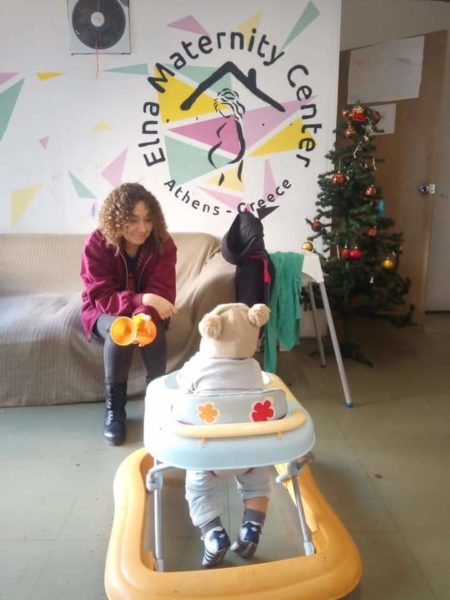 Following these reflections, I decided to pack my bags and move to Athens. I planned to stay for at least a year. And that’s how I started working with the
Following these reflections, I decided to pack my bags and move to Athens. I planned to stay for at least a year. And that’s how I started working with the 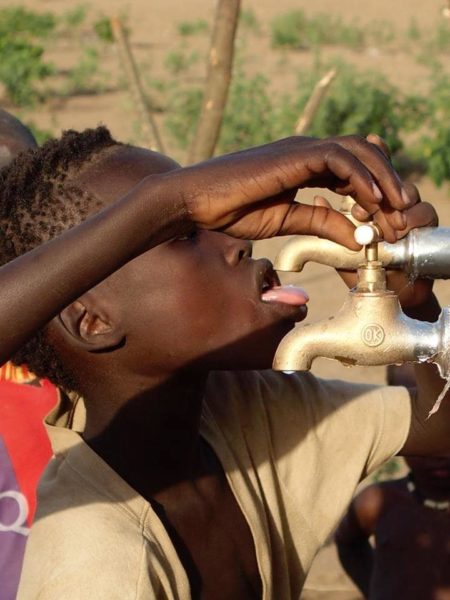 At that time my work focused on extreme urban poverty and I had never experienced being stuck in a besieged neighbourhood during a civil war, resulting in hundreds of deaths – practically ignored by media (apart from the local ones); and I was physically allergic to ethnic fashion (I still am, a bit). My future wife looked at me in silence… and less than one year later I was beside her in a Palestinian refugee camp in Lebanon. Since that moment I have done what the character of a song of Sergio Caputo (Italian songwriter, ndr) does: “I will follow you to show you something more, I’ll come with you should this be my work”.
At that time my work focused on extreme urban poverty and I had never experienced being stuck in a besieged neighbourhood during a civil war, resulting in hundreds of deaths – practically ignored by media (apart from the local ones); and I was physically allergic to ethnic fashion (I still am, a bit). My future wife looked at me in silence… and less than one year later I was beside her in a Palestinian refugee camp in Lebanon. Since that moment I have done what the character of a song of Sergio Caputo (Italian songwriter, ndr) does: “I will follow you to show you something more, I’ll come with you should this be my work”.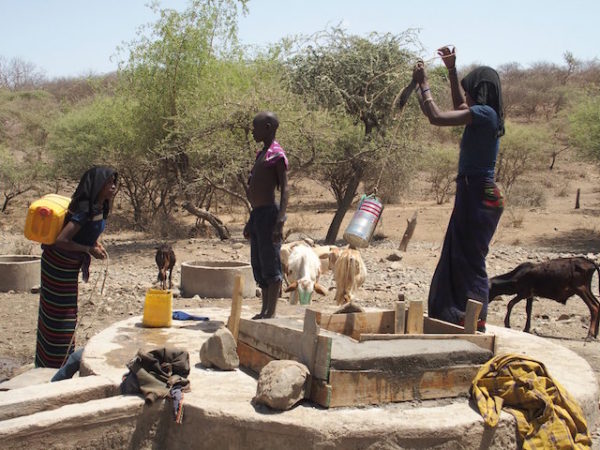 I have followed women on a three-hour trek to
I have followed women on a three-hour trek to 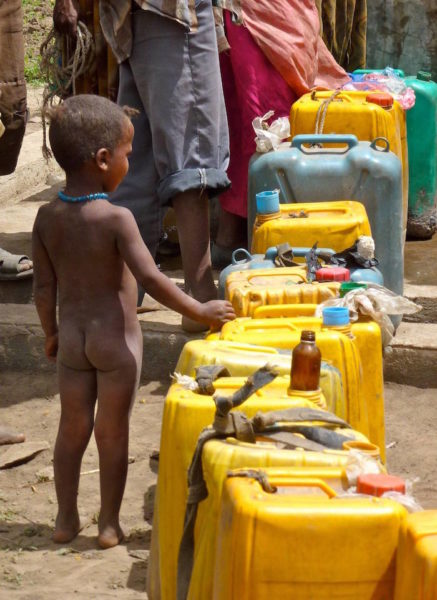 I have seen refugee camps with lean women and children as far as the eye can see, thousands of exhausted people, massed in camps between Kenya and Ethiopia, sitting on UNCHR rice bags. Being an aid worker is not a job for those who work for agencies that spend 70 or 80% of resources in staff (the aid workers I value and talk about are not only able to write projects and make ends meet; they dirty their hands – they risk). Aid workers do not think that the danger is always the fault of those who are kidnapped or attacked, or that you can always avoid danger. No, cooperation, in some places, is physically and psychologically dangerous work.
I have seen refugee camps with lean women and children as far as the eye can see, thousands of exhausted people, massed in camps between Kenya and Ethiopia, sitting on UNCHR rice bags. Being an aid worker is not a job for those who work for agencies that spend 70 or 80% of resources in staff (the aid workers I value and talk about are not only able to write projects and make ends meet; they dirty their hands – they risk). Aid workers do not think that the danger is always the fault of those who are kidnapped or attacked, or that you can always avoid danger. No, cooperation, in some places, is physically and psychologically dangerous work.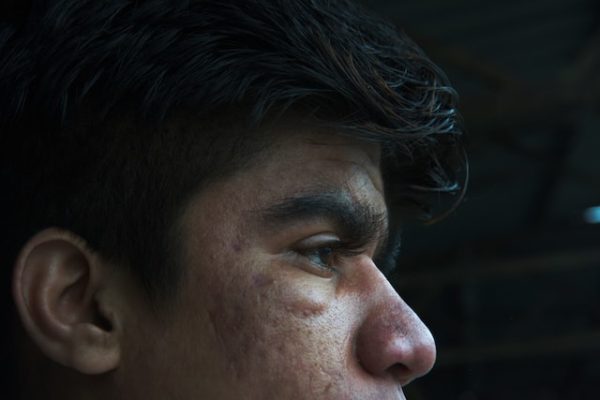 Passionate about themes like injustice, racism, discrimination and violence, Cinzia lets herself be guided by her emotions when choosing the stories to document. “Once I discover something I believe has to be denounced, I work to gain trust in the people I want to photograph. I live with them, talk to them. This allows me to see their lives from the inside, and give the right angle to my photos”.
Passionate about themes like injustice, racism, discrimination and violence, Cinzia lets herself be guided by her emotions when choosing the stories to document. “Once I discover something I believe has to be denounced, I work to gain trust in the people I want to photograph. I live with them, talk to them. This allows me to see their lives from the inside, and give the right angle to my photos”.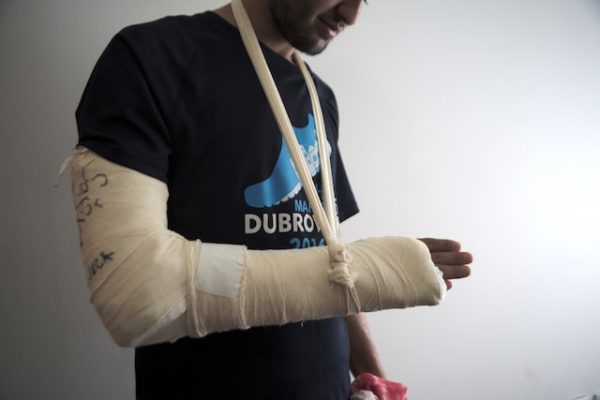
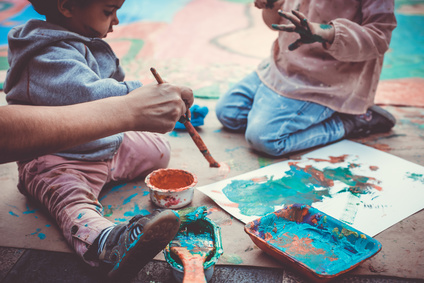 It could have been an ordinary well organized expat playgroup, like many I used to go to with my children in the past and in other countries.
It could have been an ordinary well organized expat playgroup, like many I used to go to with my children in the past and in other countries.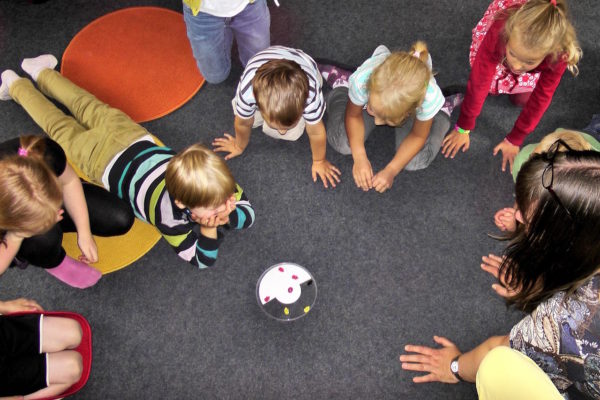 These women continued to be socially isolated and had little reason to leave the refugee shelter except to shop for food and clothing. Most of their time is spent indoors, caring for their young children without the aid of their own toys or care items, such as pushchairs/buggies and highchairs. We believed the playgroup concept would be a good way to reach out to these women and children. It also held promise of a way to pass on things like clothes, toys and baby-care items – things that are readily available from international families in our networks who are often on the move.
These women continued to be socially isolated and had little reason to leave the refugee shelter except to shop for food and clothing. Most of their time is spent indoors, caring for their young children without the aid of their own toys or care items, such as pushchairs/buggies and highchairs. We believed the playgroup concept would be a good way to reach out to these women and children. It also held promise of a way to pass on things like clothes, toys and baby-care items – things that are readily available from international families in our networks who are often on the move.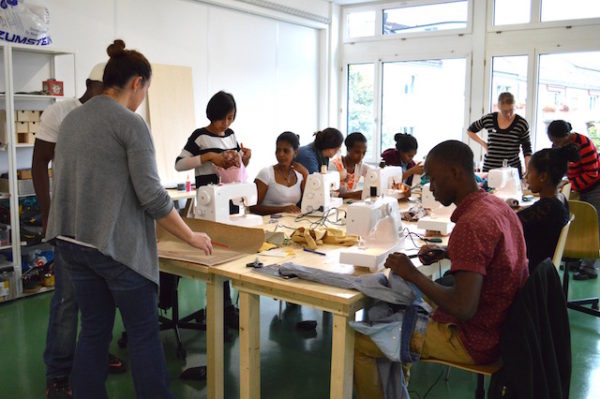 Despite having always lived in Europe, I went through the difficulties linked to the need of conforming to and understanding the rules of my new host country (including a different language). Yet, the whole experience of moving abroad and the little traumas it entails, have given me the opportunity to grow up, to change my “small-town mentality” and to look differently at people around me, at the diversity around me. My moving abroad is nothing compared to all those people (refugees or not), who leave their native countries to find better living conditions. I can understand their feelings, because after all it was the same for me: I moved to find better living conditions for my family and myself. Still, I did not run away from a war-torn place and I took an airplane to go to my new destination. I did not have to walk for kilometers or force myself onto a fragile boat, hoping not to sink in the Mediterranean sea, as it happens to so many people today.
Despite having always lived in Europe, I went through the difficulties linked to the need of conforming to and understanding the rules of my new host country (including a different language). Yet, the whole experience of moving abroad and the little traumas it entails, have given me the opportunity to grow up, to change my “small-town mentality” and to look differently at people around me, at the diversity around me. My moving abroad is nothing compared to all those people (refugees or not), who leave their native countries to find better living conditions. I can understand their feelings, because after all it was the same for me: I moved to find better living conditions for my family and myself. Still, I did not run away from a war-torn place and I took an airplane to go to my new destination. I did not have to walk for kilometers or force myself onto a fragile boat, hoping not to sink in the Mediterranean sea, as it happens to so many people today.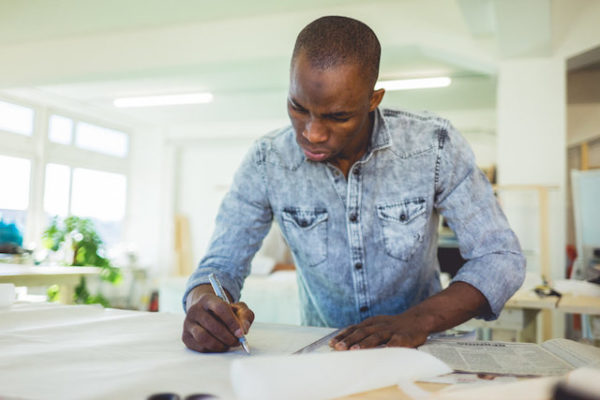 As Heather (founder of Social Fabric) says in
As Heather (founder of Social Fabric) says in